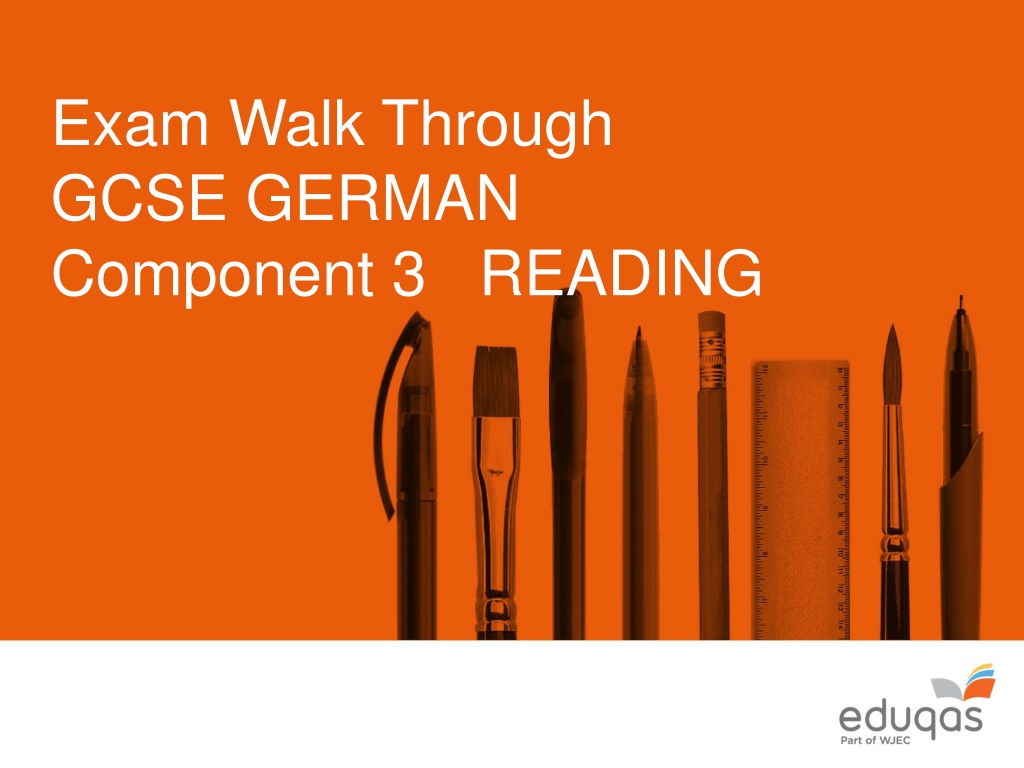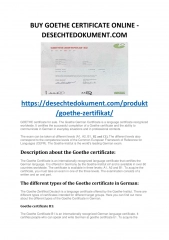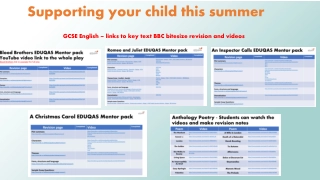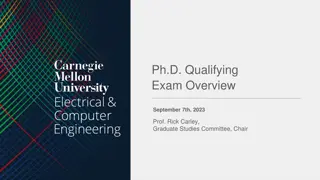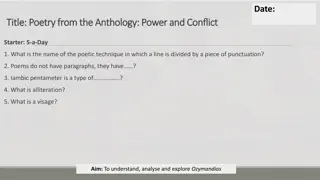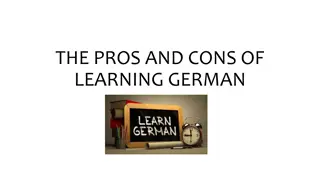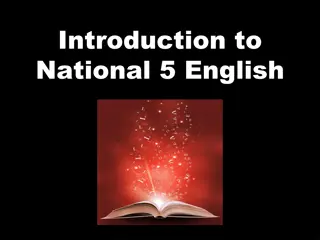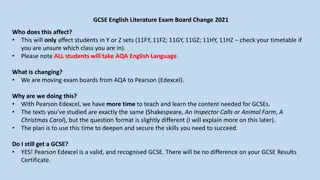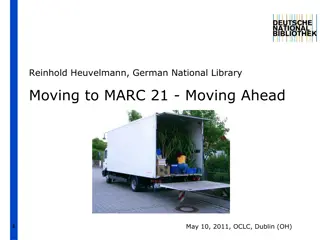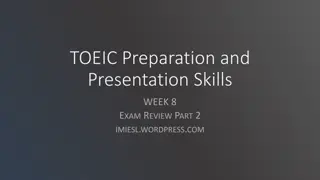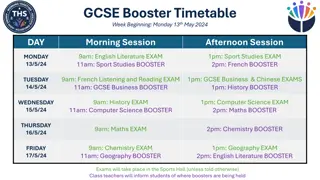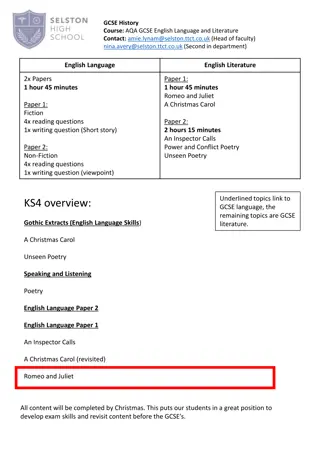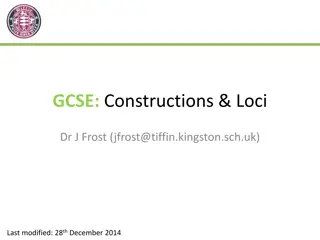GCSE German Reading Exam Walk Through
This guide provides a comprehensive walk-through for the GCSE German Component 3 Reading exam, including what to expect, how to approach each question, and essential tips for success. It covers the structure of the exam, tips on tackling different question types, and advice on time management. Follow this guide to enhance your German reading comprehension and translation skills for both Foundation and Higher Tiers of the exam.
Download Presentation

Please find below an Image/Link to download the presentation.
The content on the website is provided AS IS for your information and personal use only. It may not be sold, licensed, or shared on other websites without obtaining consent from the author. Download presentation by click this link. If you encounter any issues during the download, it is possible that the publisher has removed the file from their server.
E N D
Presentation Transcript
Exam Walk Through GCSE GERMAN Component 3 READING
What you should have in front of you: A copy of the exam paper A pen, pencil A highlighter A watch Post-it notes or paper (to jot down any questions for your teacher as you work through this presentation)
What this exam paper is all about: This paper is the GCSE Foundation and Higher READING paper. It is testing your German reading comprehension and translation skill (from German into English). The paper is made up of 10 questions in the Foundation Paper and 9 questions in the Higher Paper. The last question in each paper is the translation task. The exam lasts 1 hour for the Foundation Tier and 1 hour 15 minutes for the Higher Tier. In the Foundation Tier each question is worth 6 marks (total of 60 marks). In the Higher Tier Q6,7 and 8 (longer texts) are worth 8 marks; all other questions are worth 6 marks (total of 60 marks).
What should I do first? 1. Read the front cover of the exam paper. You will see the marks allocated for each question.
What should I do first? 1. Read the front cover of the exam paper.
What should I do first? 2. Make sure your name, centre number and candidate number are on your answer booklet (on the top of your paper).
What should I do first? 3. Read each question carefully. The questions will progressively get more demanding. You will need to spend more time on each question as you work your way through the paper. remember: Foundation Tier: 60 minutes - 10 questions Higher Tier: 75 minutes 9 questions Read in the instruction in which language to answer the questions. If the question is in German you answer in German. If the question is in English you answer in English.
How do I tackle Q.1 Foundation Tier? Question 1: skill being tested Selecting/Filtering information, identify the overall message Time for answering: approx. 4 minutes How do I get full marks: tick 1 correct answer for each question Approach: Step 1 Read the text and focus on words you know and/or cognates Step 2 Read the questions carefully and highlight key words/commands so you will know what to look for in the text Step 3 find the key words in the text match words in the questions with words from the text Step 4 tick 1 correct box TOP TIP don t overcomplicate or overthink the first question in the exam paper click here for answers to Q1F part 1 click here for answers to Q1F part 2 click here for answers to Q1F part 1 click here for answers to Q1F part 2
How do I tackle Q.2 Foundation Tier? Question 2: skill being tested Selecting/Filtering information, looking for key words Time for answering: approx. 4 minutes How do I get full marks: tick the correct box for each question Approach: similar to the approach for Q1 but this time in GERMAN find synonyms / phrases that mean the same in the text and the questions sometimes words change from a noun to an adjective or verb, but both words look similar e.g. Zucker - zuckrig click here for answers to Q2F click here for answers to Q2F
How do I tackle Q.3 Foundation Tier? Question 3: skill being tested Selecting/Filtering information, identify details Time for answering: approx. 4 minutes How do I get full marks: match up 6 people with types of problems (write the correct letter) but careful there are 9 problems but only 6 people i.e. 3 problems won t be used Approach: similar to the approach for Q1 and Q2 look out for detailed facts find synonyms / phrases that mean the same step 1: read all texts first to get an overview step 2: read the types of problems step 3: go back over the text (detailed reading) highlight vocabulary/phrases that are linked to the answers click here for answers to Q3F click here for answers to Q3F
How do I tackle Q.4 Foundation Tier? Question 4: skill being tested looking for key points, identify the overall message and facts, vocabulary knowledge, identifying the negative kein Time for answering: approx. 4 minutes How do I get full marks: match the pictures to the correct recycling bin but similar to Q.3 you have more pictures than you need (3 spare) The order of letters is irrelevant in this question. Approach: step 1: similar to the approach for Q1, Q2 and Q3 look out for detailed facts step 2: look out for cognates step 3: match up other vocabulary you know step 4: match up the remaining words the best you can click here for answers to Q4F click here for answers to Q4F
How do I tackle Q.5 Foundation Tier? Question 5: skill being tested looking for key points, responding to a longer text including some more complex structures Time for answering: approx. 5 minutes How do I get full marks: answer the questions in ENGLISH you will not get any marks for German answers keep the answers SHORT and PRECISE you do not need to write full sentences Approach: step 1: read the title: you will read traffic report you know what the text is about step 2: read the German text step 3: read the questions step 4: go back to the German texts and highlight the information you need- sometimes there is more than 1 clue Step 5: answer the questions in ENGLISH (they are in chronological order) click here for answers to Q5F click here for answers to Q5F
How do I tackle Q.6 Foundation Tier? Question 6: skill being tested understanding literary texts (authentic sources), being able to scan for information, draw inference Time for answering: approx. 6 minutes How do I get full marks: answer the questions in ENGLISH you will not get any marks for German answers keep the answers SHORT and PRECISE you do not need to write full sentences Approach: step 1:read the German text and work out the main ideas step 2: read the questions and highlight the information you will need to find in the German text step 3: go back to the German text and look for the required information you do NOT need to understand everything in the text to answer the questions but filter out the points that were asked for look out for words you know and/or cognates step 4: look at the marks in brackets each mark requires one answer; it is also made clear in the question and by the number of bullet points; the answers in the text are in chronological order click here for answers to Q6F click here for answers to Q6F
How do I tackle Q.7 Foundation Tier? Question 7: skill being tested understanding authentic texts, being able to scan for information, draw inference, recognise and respond to key points Time for answering: approx. 6 minutes How do I get full marks: answer the questions in ENGLISH keep the answers SHORT and PRECISE you do not need to write full sentences Approach: step 1: read the title to find out the main theme of the text ( interview tips ) step 2: read the German text once step 3: read the questions and highlight the information you will need to find in the German text step 4: go back to the German text and look for the required information you do NOT need to understand every word in the text to answer the questions look out for words you know and/or cognates step 5: each question is worth 2 marks you are required to give 2 details for each question. the answers in the text are in chronological order click here for answers to Q7F click here for answers to Q7F
How do I tackle Q.8 Foundation Tier / Q1 Higher Tier? Question 8 Foundation Tier / Question 1 Higher Tier: skills being tested: understanding longer texts, being able to scan for information, draw inference in context of the text, recognise and respond to key points, deduce meaning Time for answering: approx. 7 minutes How do I get full marks: answer the questions in ENGLISH keep the answers SHORT and PRECISE you do not need to write full sentences Approach (similar to Q7): step 1: read the title > the theme is part-time work step 2: read the text step 3: read the questions and highlight the information you will need to find in the main text step 3: go back to the German text you do NOT need to understand every word in the text to answer the questions look out for words you know and/or cognates step 4: look at the marks in the brackets for each question and read each question carefully to find out how many details you need to give the answers in the text are in chronological order click here for answers to Q8F/Q1H click here for answers to Q8F/Q1H
How do I tackle Q.9 Foundation Tier / Q2 Higher Tier? Question 9 Foundation Tier / Question 2 Higher Tier: skills being tested: understanding literary texts (authentic sources), being able to scan for information, draw inference in context of the text, recognise implicit meaning in longer texts Time for answering: approx. 7 minutes How do I get full marks: answer the questions in ENGLISH keep the answers SHORT and PRECISE you do not need to write full sentences Approach (similar to Q7 and Q8): step 1: read the instruction and sub-heading which sets the scene step 2: read the German literary text step 3: read the questions and highlight the information you will need to find in the German text step 4: go back to the German text and look for the required information you do NOT need to understand every word in the text to answer the questions look out for words you know and/or cognates step 5: try and find the place in the text by looking for key language e.g. a month ago vor einem Monat look at the marks in brackets each mark requires one answer; it is also made clear in the question and by the number of bullet points the answers in the text are in chronological order If you see write one detail in the question there will be more than one detail in the text but you only need to find one! click here for answers to Q9F/Q2H click here for answers to Q9F/Q2H
How do I tackle Q.10 Foundation Tier (translation into English)? In Question 10 your translation skills will tested; every detail must be translated Time for answering: approx. 6 minutes How do I get full marks: you must translate each part of the text into a coherent English text Approach: step 1: read the full text to get an idea what theme is covered step 2: split the text into 6 sentences/sentence parts 1 mark for each sentence step 3: to start translate the words you understand step 4: avoid literal translation step 4: make sure that your English answers make sense read over your answers: is the text coherent? step 5: check you use the correct tenses you will be tested on more than just the present tense step 6: make sure you do not leave out little words, e.g. sehr, aber etc. click here for answers to Q10F click here for answers to Q10F
How do I tackle Q3 Higher Tier? Question 3 Higher Tier: skills being tested: understanding authentic sources (factual texts), draw inference in context of the text, recognise implicit meaning in longer texts, demonstrate understanding by being able to scan for particular information Time for answering: approx. 6 minutes How do I get full marks: match the correct detail to each motorway beware: you have more options than you need Approach: step 1: read the instruction which sets the scene ( Verkehrsprobleme ) step 2: read the entire German text step 3: read the questions and highlight the information you will need to find in the German text step 4: go back to the German text and look for the required information you do NOT need to understand every word in the text to answer the questions look out for words you know and/or cognates and/or synonyms click here for answers to Q3H click here for answers to Q3H
How do I tackle Q4 Higher Tier? Question 4 Higher Tier: skills being tested: understanding opinions and justifications, recognise implicit meaning in longer texts, demonstrate understanding by being able to scan for particular information, organise and present relevant details, distinguish between tenses Time for answering: approx. 5 minutes How do I get full marks: the multiple choice options are in GERMAN so you will need more time to read the options carefully Approach: step 1: read the instruction and heading which sets the scene Schulleben step 2: read the German texts step 3: read the options and highlight the information you will need to find in the German texts step 4: go back to the German texts and look out for words you know and/or cognates and/or synonyms click here for answers to Q4H click here for answers to Q4H
How do I tackle Q5 Higher Tier? Question 5 Higher Tier: skills being tested: recognise implicit meaning in longer factual texts, demonstrate understanding by being able to scan for particular information, organise and present relevant details, understand opinions and tense, deduce meaning Time for answering: approx. 6 minutes How do I get full marks: the multiple choice options are in GERMAN so you will need more time to read the options carefully, tick the correct boxes. Approach (similar to Q4): step 1: read the instruction and heading Urlaubstyp is a usefull clue for (a) step 2: read the German texts step 3: read the options and highlight the information you will need to find in the German texts step 4: go back to the German texts and look out for words you know and/or cognates and/or synonyms step 5: look out for pointers: in this text the name of the countries find the right country for each question (in chronological order) click here for answers to Q5H click here for answers to Q5H
How do I tackle Q6 Higher Tier? Question 6 Higher Tier: skills being tested: recognise implicit meaning in longer texts, demonstrate understanding by being able to scan for particular information, deduce meaning, understand factual texts (authentic) Time for answering: approx. 8 minutes How do I get full marks: this question carries 8 marks so you need to give yourself more time; keep your answers short and precise Approach: step 1: read the German text once step 2: read the questions and highlight the information you will need to find in the German text step 3: go back to the German text and look for the required information you do NOT need to understand every word in the text to answer the questions look out for words you know and/or cognates (investiert /W rme/fossile) look at the marks in brackets each mark requires one answer; make sure you give 2 details when required in the question the answers in the text are in chronological order If you see write two details in the question there will be more than two details in the text! click here for answers to Q6H click here for answers to Q6H
How do I tackle Q7 Higher Tier? Question 7 Higher Tier: skills being tested: recognise implicit meaning in longer texts, demonstrate understanding by being able to scan for particular information, understand literary text (authentic), draw inferences Time for answering: approx. 8 minutes How do I get full marks: this question carries 8 marks so you need to give yourself more time; keep your answers short and precise Approach (similar to Q6) : step 1: read the title to set the scene step 2: read the German text once step 3: read the questions and highlight the information you will need to find in the German text step 4: make sure you read the correct question words: where/ why / what / how step 5: go back to the German text and look for the required information you do NOT need to understand every word in the text to answer the questions look out for words you know and/or cognates step 6: to find the right passage in the text look out for the person the question refers to: Henriette, her mum or Elin? look at the marks in brackets each mark requires one answer; the answers in the text are in chronological order click here for answers to Q7H click here for answers to Q7H
How do I tackle Q8 Higher Tier? Question 8 Higher Tier: skills being tested: recognise implicit meaning in longer texts, demonstrate understanding by being able to scan for particular information, draw inferences in context Time for answering: approx. 8 minutes How do I get full marks: this question carries 8 marks so you need to give yourself more time; keep your answers short and precise Approach (similar to Q6/Q7) : step 1: read the sub-heading to set the scene step 2: read the German text once step 3: read the questions and highlight the information you will need to find in the German text step 4: go back to the German text and look for the required information you do NOT need to understand every word in the text to answer the questions look out for words you know and/or cognates look at the marks in brackets each mark requires one answer; it is also made clear in the question and by the number of bullet points the answers in the text are in chronological order click here for answers to Q8H click here for answers to Q8H
How do I tackle Q9 Higher Tier (translation into English/Welsh)? In Question 9 your translation skills will tested; every detail must be translated Time for answering: approx. 8 minutes How do I get full marks: you must translate each part of the text into a coherent English text Approach: step 1: read the full text to get an idea what theme is covered step 2: split the text into 6 sentences 1 mark for each sentence step 3: translate the words you understand to start step 4: avoid literal translation step 5: make sure that your English answers make sense read over your answers: is the text coherent? step 6: check you use the correct tenses you might be tested on the present, past and future tense + conditional step 7: make sure you do not leave out little words, e.g. zu (viele) etc. click here for answers to Q9H click here for answers to Q9H
Top Tips Summary The timings for each question are approximate and you might have some time at the end of the exam ensure that you leave NO question unanswered. Read each question PROPERLY and highlight what information is required where (place), when (time), why (reason), how often (frequency) etc.. When answering in English be SHORT and PRECISE but make sure you answer is not ambiguous to the examiner. Check your translation and English answers again do they make sense? Do you clearly express what you are trying to say (no ambiguity, clear coherence)? Make sure that you have ticked the correct amount of boxes do not tick more than required or marks will be deducted. Do not panic or give up when you come across several words in one text that you don t know. Focus on what you KNOW and check if this will answer the questions. Remember that you are not required to understand EVERY word in the texts. You will only need to answer what the questions require. Make sure you know as many little words as possible (adverbs, quantifiers, frequency words). Look out for synonyms e.g. freundlich nettgern helfen hilfsbereit Look out for opposites e.g. intelligent dumm alt - jung
How do I tackle Q.2 Foundation Tier? highlight the structures/words/phrases that show matching pairs sometimes you get 2 clues distractors: nicht zu viel Fleisch linked to vegetarisch
Any Questions? Do you have any further questions about this exam? If so, write them on a post-it note and stick it to the front of your paper to give to your teacher.
How do I tackle Q.1 Foundation Tier? distractors: Croissant linked to cooking schwimmen linked to leisure centre swimming / cycling / hiking (any 2)
How do I tackle Q.1 Foundation Tier? distractors: Ohrring linked to jewellery Sportschuhe linked to sports club you need to understand the negative keine sports shoes (trainers) and earrings
How do I tackle Q.3 Foundation Tier? F B D H E C
How do I tackle Q.4 Foundation Tier? B C F D H G
How do I tackle Q.5 Foundation Tier? beginning of school holidays in England this weekend stay home if possible go middle of next week enough petrol in tank take drinks with you
How do I tackle Q.6 Foundation Tier? her holiday plans have changed / were cancelled golden beaches a private room with balcony it s a research ship children are not allowed on board it would be boring any 2 throws the map of the word into the bin OR starts to cry
How do I tackle Q.7 Foundation Tier? you should have eaten you should be rested it should be clean you should feel good in your clothes too much perfume too much make-up too much jewellery (any 2)
How do I tackle Q.8 Foundation Tier / Q1 Higher Tier? it s incorrect customers often make stupid comments to be on her legs for 8 hours they don t put back products correctly they want to go shopping at 6pm when the supermarket is closing to earn her own money to support her parents
How do I tackle Q.9 Foundation Tier / Q2 Higher Tier? working in the restaurant it is Viki s birthday she has to work on her birthday she would prefer to be alone afterwards a surprise party because her father is a drinker
How do I tackle Q.10 Foundation Tier (translation into English/Welsh)? 1. Geschichte ist mein Lieblingsfach, History is my favourite subject, 2. weil es einfach ist. because it is easy. 3. Ich bin gestern Abend zum Informatikklub gegangen. Last night I went to the IT club. 4. Die Lehrerin war hilfsbereit und lustig. The teacher was helpful and funny. 5. Ich habe dann meine Mathehausaufgaben zu Hause gemacht. Then I did my maths homework at home. 1. Mathe ist sehr wichtig, aber kompliziert. Maths is very important, but watch out for different tense: present tense past tense complicated
How do I tackle Q3 Higher Tier? look out for words that are similar e.g.: C D A H B E neblig (adjective) Nebel (noun) Starkregen Regen Glatteis Eis
How do I tackle Q4 Higher Tier? w rde = would like to, but she actually goes by bus
How do I tackle Q6 Higher Tier? fossile fuels (such as coal and oil) are coming to an end soon / are running out they are also damaging the climat you can create energy from wind everywhere nature reserves you can create electricity AND heat they invest in renewable energy / solar energy / wind energy / hydro energy (any 2) limited sunshine / often cloudy or rainy
How do I tackle Q7 Higher Tier? fast food (hamburger) or ready meals (ready-made lasagne or frozen pizza) she is very busy and has no time she is proud even her dog wouldn t eat it boring cultural events OR eating a lot of vitamins OR eat as healthily as possible (2 out of 3) if you can overdose on vitamines from the garden for (f) you need to draw inferences this is a challenging question because you need to work out that Albert is a dog even he would not eat the food
How do I tackle Q8 Higher Tier? for (e) you need to draw inferences this is a challenging question because you need to work out that Albert is a dog even he would not eat the food
How do I tackle Q9 Higher Tier (translation into English/Welsh)? 1. Meiner Meinung nach ist die Universit t zu teuer, zu teuer = too expensive In my opinion (going to) university is too expensive, 2. aber meine Eltern finden Qualifikationen wichtig. present tense but my parent find qualifications important. 3. Letztes Jahr habe ich die Schule verlassen, weil ich Geld verdienen wollte, 3 pointers to the past tense Last year I left school, because I wanted to earn money, 4. um ein Auto zu kaufen. um zu structure (in order) to buy a car. 5. Es gab zu viele Pr fungen und ich habe das stressig gefunden. zu viele = too many 2x past tense There were too many exams and I found it/that stressful. 6. Wenn ich lter bin, m chte ich in einem B ro arbeiten. reference to the future AND use of conditional When I am older I would like to work in an office.
Any Questions? Do you have any further questions about this exam? If so, write them on a post-it note and stick it to the front of your paper to give to your teacher.
